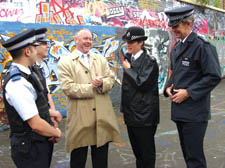|
|
 |
| |

Deputy leader Cllr Terry Stacy, Chief Insp Jane Johnson and project leader Insp Richard Stacpoole |
Islington news | Pilot 'kiss and tell' scheme | offenders | crime victims | Insp. Richard Stacpoole | Film IT
Mixed welcome for pilot project holding offenders to account for actions
A PILOT “kiss and make up” project bringing victims of crime in Islington face to face with offenders met with a mixed reaction this week.
Critics branded the restorative justice scheme a “waste of time”. The project gives victims of minor crime a voice and allows offenders to hear first-hand how their actions have affected others. It also gives offenders the chance to make amends.
But Islington Pensioners Forum chairman George Durack said: “Quite honestly, does this mean that if someone beats someone over the head you are going to go and kiss them?
“There might be many Christians out there willing to forgive and forget but not as many as they think. I know this is for small crimes like graffiti but the worry is that it could ultimately be used for more serious crimes of violence.
“Restorative justice is a nice idea but it won’t work. Let’s have more police on the beat, stopping crime happening in the first place.”
Others supported the scheme. Kate Calvert, chairwoman of Better Archway Forum, thought it was a good idea.
She added: “Everything I’ve read says that this scheme will be extremely helpful in cutting minor crime. It makes sense to me because I believe human contact is essential if we are ever to defeat crime.
“I’d like to meet the people who drop bottles, tins and litter around here. I’d explain to them that they wouldn’t like having all this litter around their homes so why not use a bin.”
Islington youth crime charity Film IT, which is based at the Business Design Centre, gave the project the thumbs-up.
Spokeswoman Sue Dawson said: “This is a wonderful scheme. It empowers the victim to ask the question: why? why? It engages the young and is cost effective.”
Islington police, backed by the council, have introduced the scheme in an attempt to cut the risk of re-offending. It is being piloted in Caledonian, St George’s, Hillside, Finsbury Park and Highbury West wards.
In some instances there will be “instant” restorative justice on the street by an officer. For instance, vandals will be made to remove graffiti. In other cases a conference with all the parties involved will be arranged.
The aim is to establish how the victim has been affected, to hold the offender to account and to reach an agreement about how to put things right.
Restorative justice will be used to tackle anti-social behaviour on housing estates, in schools and youth clubs. It is being used alongside anti-social behaviour contracts to tackle unruly youths on the Bemerton estate.
Chief Inspector Jane Johnson, of Islington police, said: “Quite often offenders do not fully understand the impact of their actions. Explaining this to them can actually reduce the risk of them re-offending.” Lib Dem community safety chief Councillor Terry Stacy said: “We’ll use everything available to tackle crime, and restorative justice is a powerful new tool. In other parts of the country it has helped victims recover from the impact of crime, and also persuaded some offenders to change their lives.” |
 |
|
| |
| |
| |
| |
| |
|
 |
|